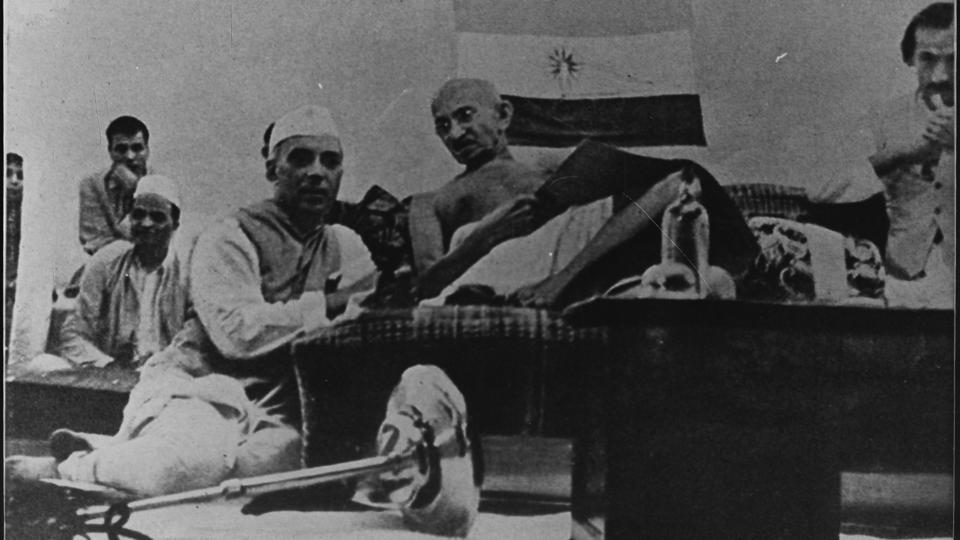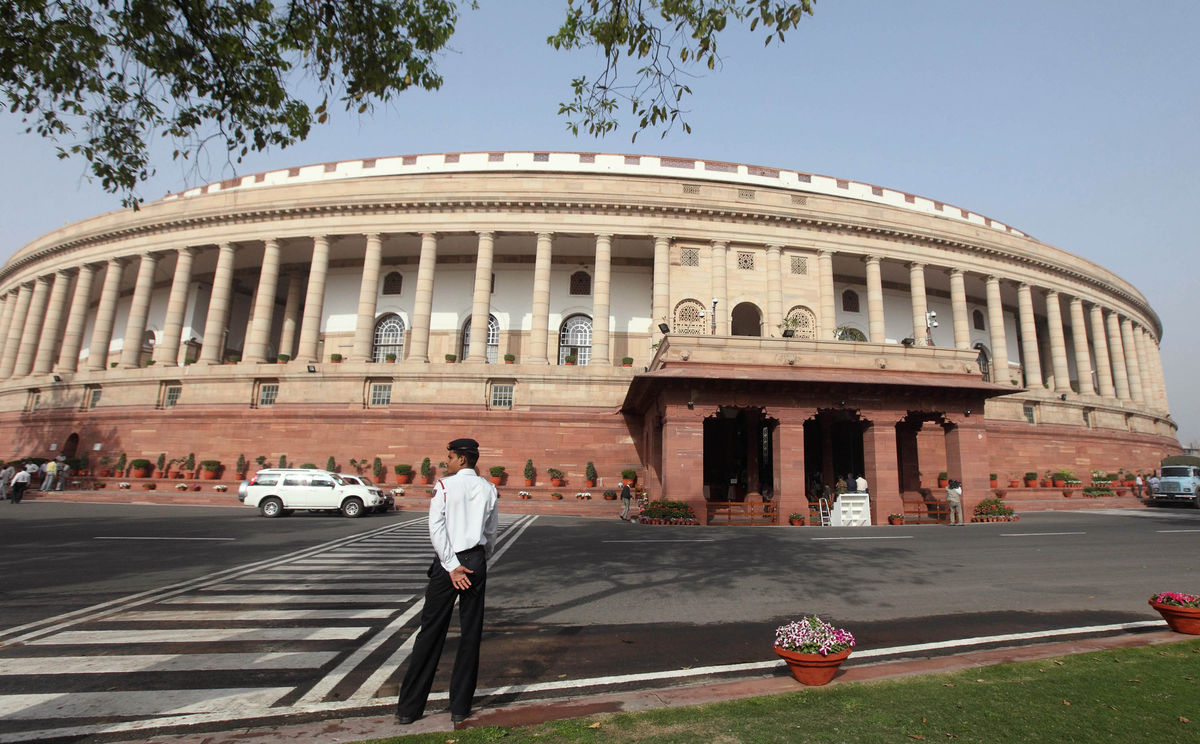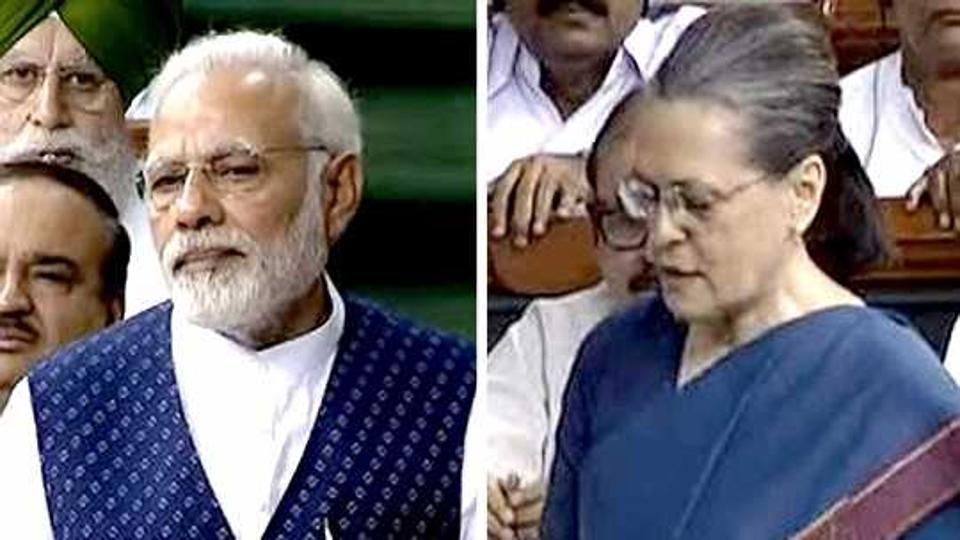Feature
Special Parliament session on 75th Anniversary of Quit India Movement

New Delhi: The Lok Sabha and Rajya Sabha are having a special discussion to commemorate the 75th anniversary of Quit India Movement in the forenoon. Both Houses of the Parliament were adjourned after doing very little business due to sloganeering and protests.
Speaker reads the pledge and the House adopts it unanimously. Speaker read obituary reference of Sanwar Lal Jat. He passed away today. The House pays silent tributes. Former Prime Minister Deve Gowda speaks. Today, forgetting all our differences, this House is going to pledge to remove all our issues we are ruling ourselves.
Vice President makes a statement on Quit India Movement. He leads the House to take a pledge on building an inclusive, self-reliant, tolerant, secular and democratic India. The House unanimously agrees.
Sanjay Raut, Shiv Sena, recalls the contribution of Veer Savarkar. He points at Congress and says a visit to Andmans will make you realise how life was in Cellular jail.
Naresh Gujral (SAD) recalls how his entire family was jailed for participating in the movement. This included children, he says. Today we breathe free, thanks to them. But are we realising their dream of a tolerant India, he says.
Jithendar Reddy says today we require orderly withdrawal of social evils. Gandhian ideology can ensure this. The English have left but the legacy remains. We should revamp the colonial bureaucracy and draconian taxation, he says.
Kanimozhi recites Subramania Bharati’s verse and recalls the contribution of Tamils in freedom struggle. There were many freedom fighters who are not Hindus, who didn’t follow any religion, who didn’t speak Hindi, and ate what a certain section felt they shouldn’t eat. Are they lesser Indians?
It is a shame that untouchability and ‘honour’ killing are being practiced even today. The temple carts still don’t visit Dalit streets. Is this the freedom we wanted? She talks about the Chandigarh stalking incident, how leaders indulged in victim blaming. What is the point of passing Bills without adequate representation of women in both the Houses? she says.
Majeed Memon says today must be celebrated as a National festival, just like how we celebrate Independence Day. Even though we gained political independence, the freedom from poverty, hunger, discrimination, violence and hatred have not been gained. We have to raise above politics and get ‘total freedom,’ he says.
Veer Singh (BSP) recalls the contribution of B.R. Ambedkar. It is sad that both the Leader of the House and Leader of Opposition didn’t name him. We talk about Rani Laxmibai. It is Jhalkaribai who actually fought in the battle. But her name is not highlighted because she is a Dalit.
Sitaram Yechury says we achieved independence through unity — the Dalit, the Brahmin, the Rajput, the cow eater, cow worshiper all were together, he says. A.K. Gopalan hoisted the tricolour from a jail in Vellore. The five years from Quit India to Independence, the nation saw partition, communalism, riots Mr. Yechury says. “Why not talk about unemployment and poverty,” asks Ravi Shankar Prasad.
You have to quit the economic policy that is creating two Indians, the policies that is creating poverty and unemployment. Today 69% of GDP is with 1% population, he says.
The Quit India movement instilled new confidence among masses, he says. The most important part of the movement is that the British realized they could no longer colonialise India.
Prime Minister Narendra Modi speaks for the first time in the monsoon session. He recalls the “August revolution”, the other name of Quit India Movement. The British would have not thought of a revolution of this scale. When senior leaders were imprisoned, new leaders like Shastri, Ram Manohar Lohia and Jayaprakash Narayan rose and took the movement forward.
Next to speak is Sonia Gandhi. This is her first speech in the monsoon session. She recalls how people proceeded with the movement even after police excess and police firing. We shouldn’t forget that there were people who were against the freedom. Are the dark forces regrouping again now, she wonders.
We should remember that our leaders fought for a peaceful and progressive nation. But there’s a sentiment of hate and violence today. We should move towards a future keeping in mind the sacrifices of them, she says while ending the speech.
Samajwadi Party leader Ram Gopal Yadav recalls the contributions of Lohia and Jayaprakash Narayan in the freedom struggle. He recalls partition. Dr. Lohia was against partition. Today, we’ve lost Tibet. We are taking visa to visit holy Kailash mountains, he says.
It is not a difficult task to fulfill the wishes of Gandhi when the country stays united, says Mr. Modi. The world learnt a lot from us in 1942. The world can learn a lot from us even today. The nation is above politics, says Mr. Modi.
Entertainment
Meghalaya Reserves Legalized Gambling and Sports Betting for Tourists

The State Scores Extra High on Gaming-Friendly Industry Index
Meghalaya scored 92.85 out of 100 possible points in a Gaming Industry Index and proved to be India’s most gaming-friendly state following its recent profound legislation changes over the field allowing land-based and online gaming, including games of chance, under a licensing regime.
The index by the UK India Business Council (UKIBC) uses a scale of 0 to 100 to measure the level of legalisation on gambling and betting achieved by a state based on the scores over a set of seven different games – lottery, horse racing, betting on sports, poker, rummy, casino and fantasy sports
Starting from February last year, Meghalaya became the third state in India’s northeast to legalise gambling and betting after Sikkim and Nagaland. After consultations with the UKIBC, the state proceeded with the adoption of the Meghalaya Regulation of Gaming Act, 2021 and the nullification of the Meghalaya Prevention of Gambling Act, 1970. Subsequently in December, the Meghalaya Regulation of Gaming Rules, 2021 were notified and came into force.
All for the Tourists
The move to legalise and license various forms of offline and online betting and gambling in Meghalaya is aimed at boosting tourism and creating jobs, and altogether raising taxation revenues for the northeastern state. At the same time, the opportunities to bet and gamble legally will be reserved only for tourists and visitors.
“We came out with a Gaming Act and subsequently framed the Regulation of Gaming Rules, 2021. The government will accordingly issue licenses to operate games of skill and chance, both online and offline,” said James P. K. Sangma, Meghalaya State Law and Taxation Minister speaking in the capital city of Shillong. “But the legalized gambling and gaming will only be for tourists and not residents of Meghalaya,” he continued.
To be allowed to play, tourists and people visiting the state for work or business purposes will have to prove their non-resident status by presenting appropriate documents, in a process similar to a bank KYC (Know Your Customer) procedure.
Meghalaya Reaches Out to a Vast Market
With 140 millions of people in India estimated to bet regularly on sports, and a total of 370 million desi bettors around prominent sporting events, as per data from one of the latest reports by Esse N Videri, Meghalaya is set to reach out and take a piece of a vast market.
Estimates on the financial value of India’s sports betting market, combined across all types of offline channels and online sports and cricket predictions and betting platforms, speak about amounts between $130 and $150 billion (roughly between ₹9.7 and ₹11.5 lakh crore).
Andhra Pradesh, Telangana and Delhi are shown to deliver the highest number of bettors and Meghalaya can count on substantial tourists flow from their betting circles. The sports betting communities of Karnataka, Maharashtra, Uttar Pradesh and Haryana are also not to be underestimated.
Among the sports, cricket is most popular, registering 68 percent of the total bet count analyzed by Esse N Videri. Football takes second position with 11 percent of the bets, followed by betting on FIFA at 7 percent and on eCricket at 5 percent. The last position in the Top 5 of popular sports for betting in India is taken by tennis with 3 percent of the bet count.
Local Citizens will Still have Their Teer Betting
Meghalaya residents will still be permitted to participate in teer betting over arrow-shooting results. Teer is a traditional method of gambling, somewhat similar to a lottery draw, and held under the rules of the Meghalaya Regulation of the Game of Arrow Shooting and the Sale of Teer Tickets Act, 2018.
Teer includes bettors wagering on the number of arrows that reach the target which is placed about 50 meters away from a team of 20 archers positioned in a semicircle.
The archers shoot volleys of arrows at the target for ten minutes, and players place their bets choosing a number between 0 and 99 trying to guess the last two digits of the number of arrows that successfully pierce the target.
If, for example, the number of hits is 256, anyone who has bet on 56 wins an amount eight times bigger than their wager.




























